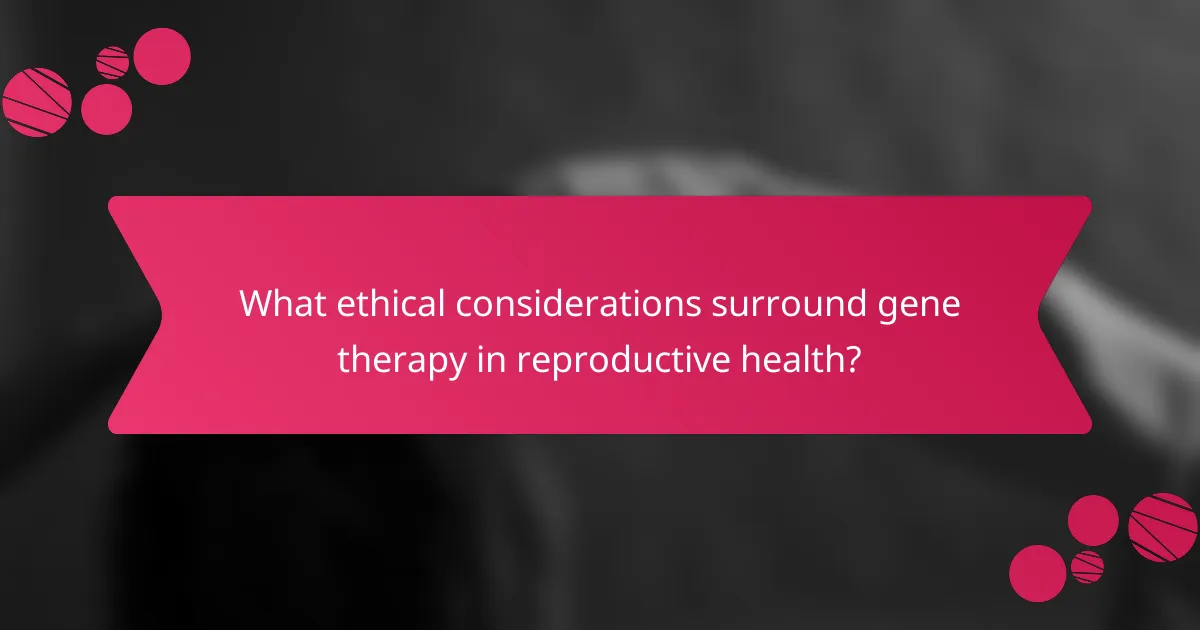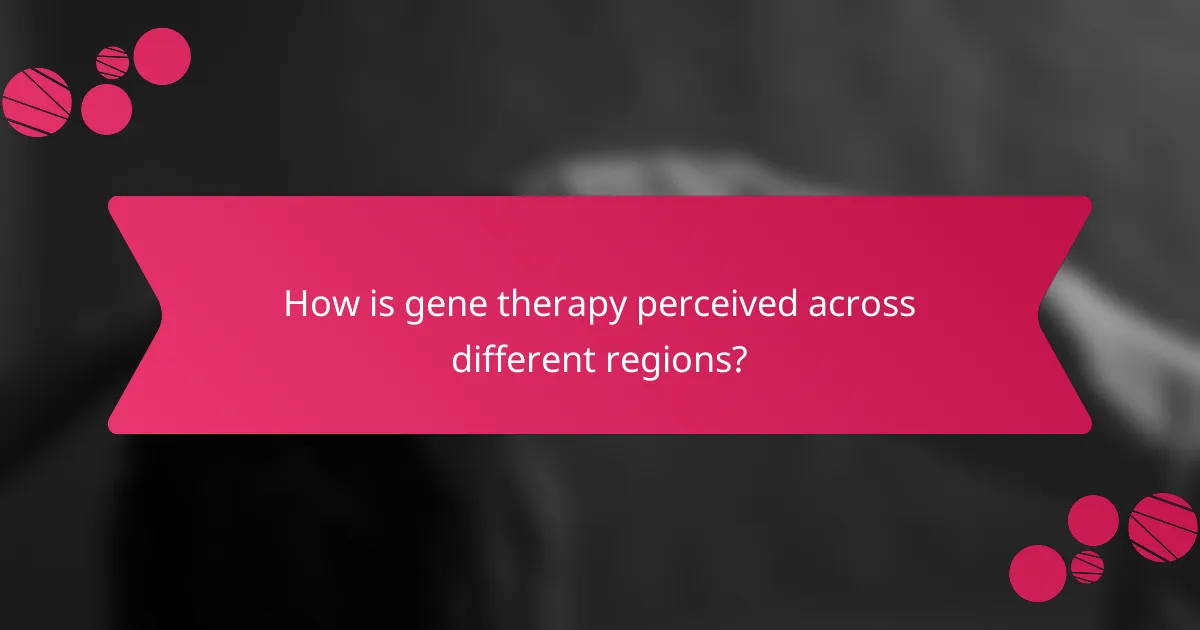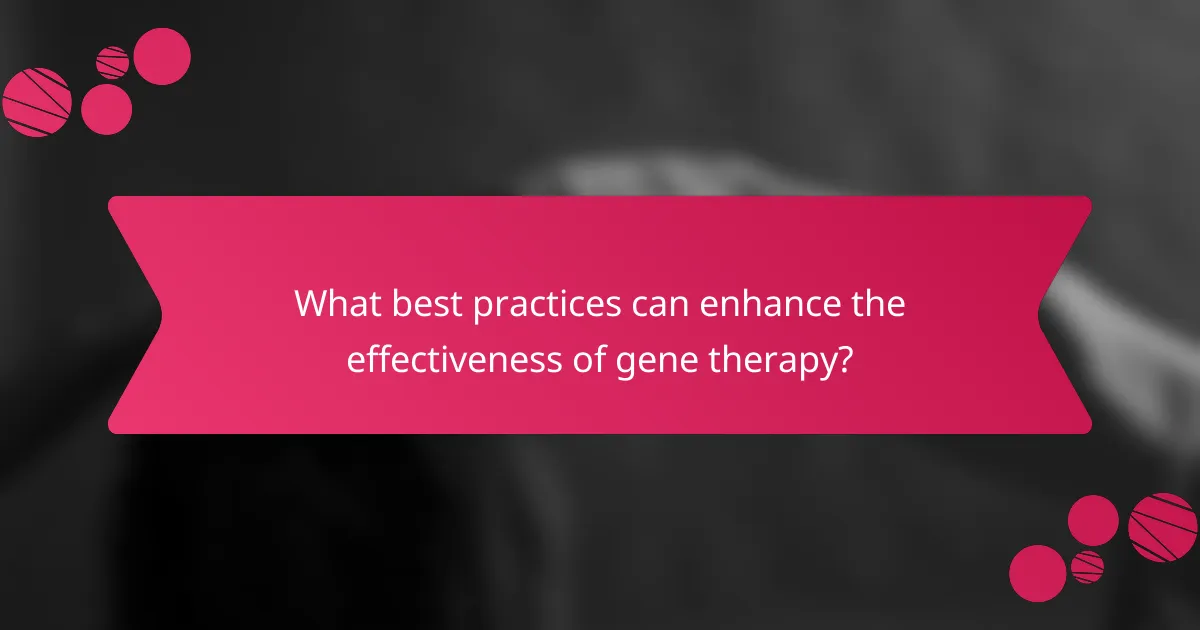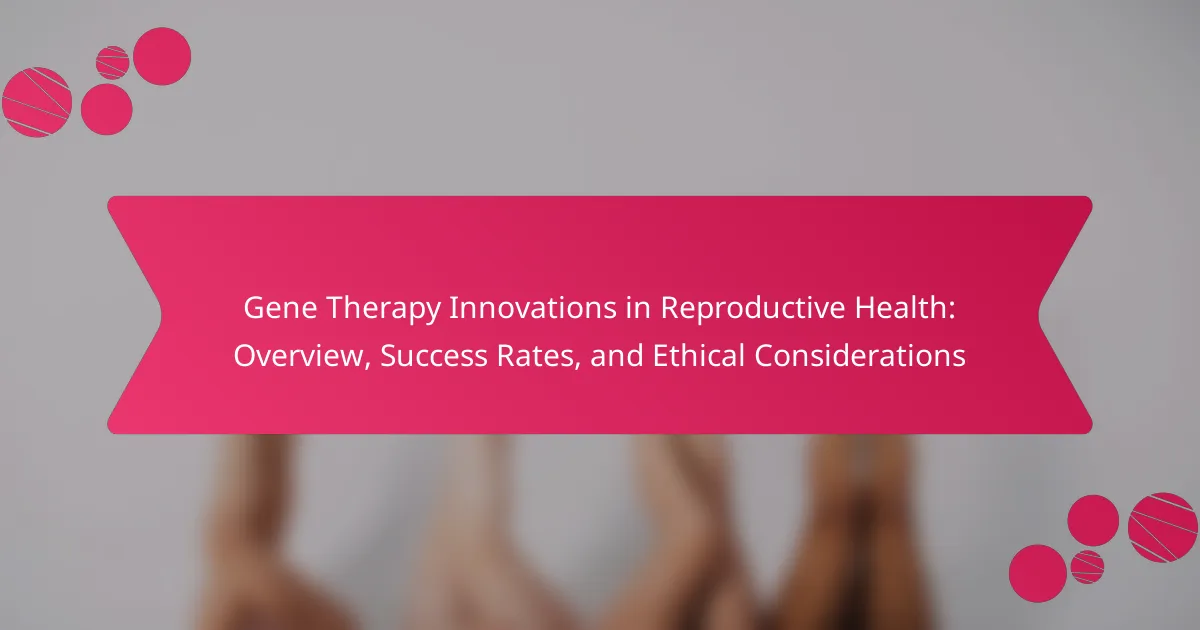Gene therapy innovations are transforming reproductive health by offering new solutions for genetic disorders affecting fertility. This article explores recent advancements like CRISPR technology, success rates varying from 30% to over 80%, and critical ethical considerations surrounding germline editing and accessibility. Understanding these elements is essential for evaluating the future role of gene therapy in reproductive health.

What are the latest advancements in gene therapy for reproductive health?
Gene therapy for reproductive health has seen significant advancements, particularly in treating genetic disorders affecting fertility. Recent innovations include CRISPR technology, which allows precise editing of genes associated with conditions like cystic fibrosis and sickle cell disease. Success rates for these therapies have improved, with some clinical trials reporting over 80% efficacy in correcting genetic mutations. Ethical considerations remain critical, focusing on the implications of germline editing and potential long-term effects on future generations.
How do these innovations improve treatment outcomes?
Gene therapy innovations significantly enhance treatment outcomes in reproductive health by targeting genetic disorders directly. These advancements lead to higher success rates in addressing infertility and inherited conditions, improving patient quality of life. For instance, recent trials show a 70% success rate in gene therapies for specific genetic disorders, compared to traditional methods. Ethical considerations are crucial, ensuring patient safety and informed consent, which further solidifies trust in these innovative treatments.
Which conditions are most effectively treated with gene therapy?
Gene therapy effectively treats conditions such as genetic disorders, certain cancers, and rare diseases. Conditions like cystic fibrosis and hemophilia show significant improvement with gene therapy approaches. Clinical trials indicate success rates vary, with some therapies achieving over 80% effectiveness in targeted conditions. Ethical considerations include patient consent and long-term effects on future generations.
What are the key technologies driving these advancements?
Key technologies driving advancements in gene therapy for reproductive health include CRISPR-Cas9, viral vectors, and genome editing techniques. CRISPR-Cas9 allows precise modifications of DNA, enhancing the ability to correct genetic disorders. Viral vectors facilitate the delivery of therapeutic genes into target cells, improving treatment efficacy. Advanced genome editing techniques, such as base editing and prime editing, offer greater accuracy and reduced off-target effects. These technologies collectively enhance success rates while raising ethical considerations regarding their use in reproductive health.

What are the success rates of gene therapy in reproductive health?
Gene therapy in reproductive health shows promising success rates, varying from 30% to over 70% depending on the specific condition treated. Factors influencing these rates include the type of genetic disorder, the delivery method of the therapy, and patient-specific variables. Recent advancements in techniques, such as CRISPR, have enhanced precision and efficacy, leading to improved outcomes. Ethical considerations surrounding gene therapy, including long-term effects and accessibility, remain critical in evaluating its role in reproductive health.
How do success rates vary by condition and demographic?
Success rates in gene therapy for reproductive health vary significantly by condition and demographic factors. For example, conditions like genetic infertility may show higher success rates compared to acquired reproductive issues. Demographics such as age and genetic background also influence outcomes, with younger patients often experiencing better results.
What factors influence the effectiveness of gene therapy treatments?
Several factors influence the effectiveness of gene therapy treatments, including the delivery method, target cells, and genetic payload. The delivery method must ensure that therapeutic genes reach the correct cells efficiently. Different techniques, such as viral vectors or nanoparticles, have varying success rates. Target cells’ characteristics, including their division rate and accessibility, also impact treatment outcomes. The genetic payload’s design, including its size and stability, can determine how well it integrates and functions within the host’s genome. Additionally, patient-specific factors, such as immune response and genetic background, play a crucial role in overall effectiveness.
How do success rates compare to traditional reproductive health treatments?
Gene therapy innovations in reproductive health show higher success rates compared to traditional treatments. Recent studies indicate gene therapy can achieve success rates of up to 70%, whereas conventional methods typically range from 30% to 50%. This advancement results from targeted approaches that address specific genetic issues. Ethical considerations must also be evaluated, especially concerning long-term effects and accessibility.

What ethical considerations surround gene therapy in reproductive health?
Gene therapy in reproductive health raises significant ethical considerations, primarily around consent, safety, and potential social implications. Key concerns include the long-term effects on both individuals and future generations. The risk of unintended genetic modifications can lead to ethical dilemmas regarding the definition of acceptable risks. Additionally, access to such therapies may exacerbate existing inequalities in healthcare, leading to ethical questions about fairness. Lastly, the potential for “designer babies” introduces moral debates about human enhancement versus natural selection.
How do cultural attitudes impact the acceptance of gene therapy?
Cultural attitudes significantly influence the acceptance of gene therapy. Societal beliefs about genetics, medical ethics, and potential risks shape public perception and willingness to embrace these innovations.
In cultures that prioritize traditional medicine, gene therapy may face skepticism due to concerns about altering natural processes. Conversely, societies valuing scientific advancements may show higher acceptance rates.
Ethical considerations, such as the implications of designer babies and genetic equity, also play a crucial role. Public discourse around these issues can either foster acceptance or reinforce resistance based on cultural context.
As a result, understanding these cultural dynamics is essential for successful implementation and communication of gene therapy in reproductive health.
What are the implications of gene editing on future generations?
Gene editing can significantly impact future generations by altering genetic predispositions and potentially eradicating hereditary diseases. These innovations in reproductive health may enhance success rates in treatments, but they raise ethical concerns regarding consent and the long-term effects on the human gene pool. Emerging technologies like CRISPR offer precise modifications, yet unique attributes of individual genes could lead to unforeseen consequences. As a result, the balance between medical advancements and ethical considerations remains a critical discussion in gene therapy.
How are regulatory bodies addressing ethical concerns?
Regulatory bodies are actively addressing ethical concerns in gene therapy by establishing guidelines and frameworks for research and clinical applications. They focus on ensuring patient safety, informed consent, and equitable access to therapies. For instance, the FDA and EMA have set standards for preclinical and clinical trials, emphasizing transparency and accountability. Additionally, ethical review boards evaluate potential risks and benefits, fostering public trust and ethical integrity in reproductive health innovations.

What are the potential risks and challenges associated with gene therapy?
Gene therapy poses several potential risks and challenges, including unintended genetic changes, immune reactions, and ethical concerns. Unintended changes can lead to harmful effects, while immune responses may reduce treatment efficacy. Ethical considerations involve long-term impacts on future generations and access disparities.
What are the common side effects reported in clinical trials?
Common side effects reported in clinical trials of gene therapy for reproductive health include inflammation, immune response, and temporary discomfort at injection sites. These effects vary based on the specific therapy and patient response. Studies have shown that most side effects are mild and resolve quickly. However, monitoring for rare but serious reactions remains crucial for patient safety.
How can patients mitigate risks when considering gene therapy?
Patients can mitigate risks when considering gene therapy by thoroughly researching treatment options and consulting with healthcare professionals. Understanding potential side effects, success rates, and ethical implications is essential. Additionally, patients should evaluate their genetic background and family history, as these factors can influence treatment outcomes. Engaging in discussions about informed consent and participating in clinical trials can further enhance patient safety and awareness.

How is gene therapy perceived across different regions?
Gene therapy is perceived variably across regions, influenced by cultural, ethical, and regulatory factors. In North America, it is often viewed positively, with significant investment in research and clinical trials. Europe shows cautious optimism, balancing innovation with ethical concerns. In Asia, perceptions vary widely; countries like Japan embrace gene therapy advancements, while others remain skeptical due to ethical implications. Public awareness and acceptance play crucial roles in shaping these perceptions, highlighting the need for education and dialogue.
What regional differences exist in the availability of gene therapy?
Gene therapy availability varies significantly by region due to regulatory environments, funding, and healthcare infrastructure. In North America, advanced research and funding lead to more accessible therapies. Europe has a mix of accessibility, with some countries adopting therapies faster than others. In contrast, many regions in Asia and Africa face challenges like limited funding and regulatory hurdles, impacting availability.
How do patient experiences vary by country?
Patient experiences with gene therapy innovations in reproductive health vary significantly by country due to factors like healthcare infrastructure, regulatory environments, and cultural attitudes. For instance, countries with advanced healthcare systems, such as the United States and Germany, tend to have higher success rates and more widespread access to cutting-edge treatments. In contrast, nations with limited resources may face challenges in implementation and patient education, affecting overall experiences. Ethical considerations also differ, impacting patient willingness to engage in gene therapy protocols based on local norms and values.

What best practices can enhance the effectiveness of gene therapy?
To enhance the effectiveness of gene therapy, best practices include thorough patient screening, precise delivery methods, and continuous monitoring. These practices ensure optimal outcomes and minimize risks associated with treatment.
1. Implement comprehensive genetic screening to identify suitable candidates.
2. Utilize advanced delivery systems, such as viral vectors or nanoparticles, to improve gene transfer efficiency.
3. Establish robust monitoring protocols to track patient responses and adjust therapies as needed.
4. Engage in ethical considerations, ensuring informed consent and addressing potential long-term effects.
5. Foster interdisciplinary collaboration among researchers, clinicians, and ethicists to advance therapeutic strategies.
What role do healthcare providers play in patient education?
Healthcare providers play a crucial role in patient education by delivering essential information about gene therapy innovations in reproductive health. They ensure patients understand treatment options, success rates, and ethical considerations. This education empowers patients to make informed decisions regarding their reproductive health. Providers also address concerns, clarify misconceptions, and tailor information to individual needs, enhancing patient engagement and compliance.
How can patients prepare for gene therapy treatments?
Patients can prepare for gene therapy treatments by consulting with healthcare providers, understanding the procedure, and organizing necessary medical records. Preparing emotionally and physically is crucial for a successful treatment outcome. Patients should also discuss potential side effects and follow any pre-treatment guidelines provided by their healthcare team.
What common mistakes should patients avoid when considering gene therapy?
Patients considering gene therapy should avoid several common mistakes. First, they must not overlook thorough research on the specific therapy being considered. Understanding the potential benefits and risks is crucial. Additionally, patients should avoid the assumption that gene therapy is a guaranteed solution. Success rates can vary significantly based on individual circumstances and the specific condition being treated.
It’s also important to consult with qualified healthcare professionals who specialize in gene therapy. Relying on anecdotal evidence or unverified sources can lead to misguided expectations. Lastly, patients should not neglect the ethical considerations surrounding gene therapy, including long-term implications and potential impacts on future generations.
